Gastronomy Report: Cultural Food, Events, and Festivals Significance
VerifiedAdded on 2020/12/18
|8
|1875
|192
Report
AI Summary
This report delves into the multifaceted aspects of gastronomy, exploring the impact of globalisation, homogenisation, and heterogenisation on cultural food and identity. It examines how these concepts influence the food industry and shape consumer experiences. The report further investigates the significance of gastronomy in various events and festivals, highlighting its role in enhancing social gatherings, promoting cultural exchange, and driving business opportunities. By analyzing the interplay between food, culture, and events, the report provides valuable insights into the evolving landscape of gastronomy and its broader implications.

GASTRONOMY
Paraphrase This Document
Need a fresh take? Get an instant paraphrase of this document with our AI Paraphraser
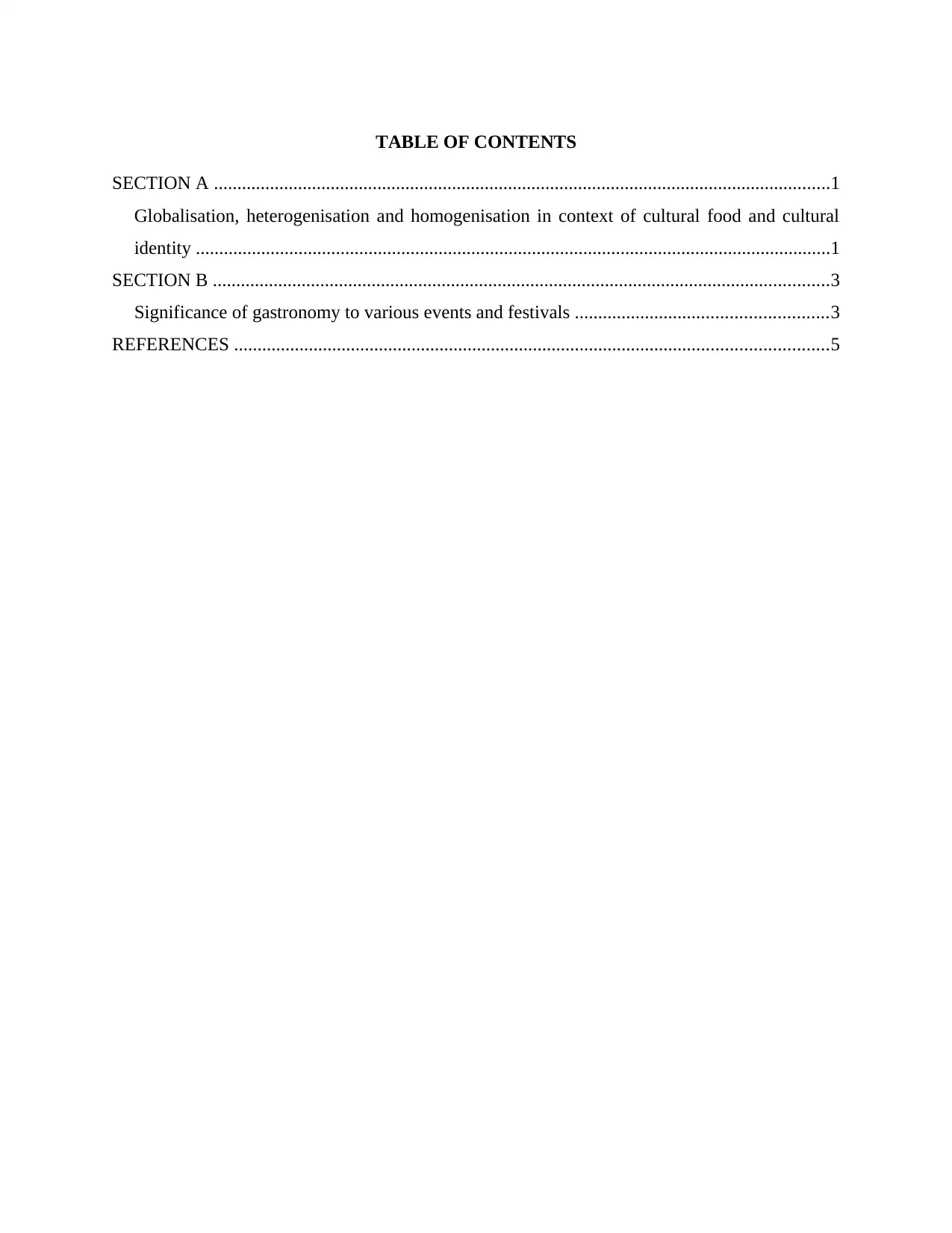
TABLE OF CONTENTS
SECTION A ....................................................................................................................................1
Globalisation, heterogenisation and homogenisation in context of cultural food and cultural
identity ........................................................................................................................................1
SECTION B ....................................................................................................................................3
Significance of gastronomy to various events and festivals ......................................................3
REFERENCES ...............................................................................................................................5
SECTION A ....................................................................................................................................1
Globalisation, heterogenisation and homogenisation in context of cultural food and cultural
identity ........................................................................................................................................1
SECTION B ....................................................................................................................................3
Significance of gastronomy to various events and festivals ......................................................3
REFERENCES ...............................................................................................................................5
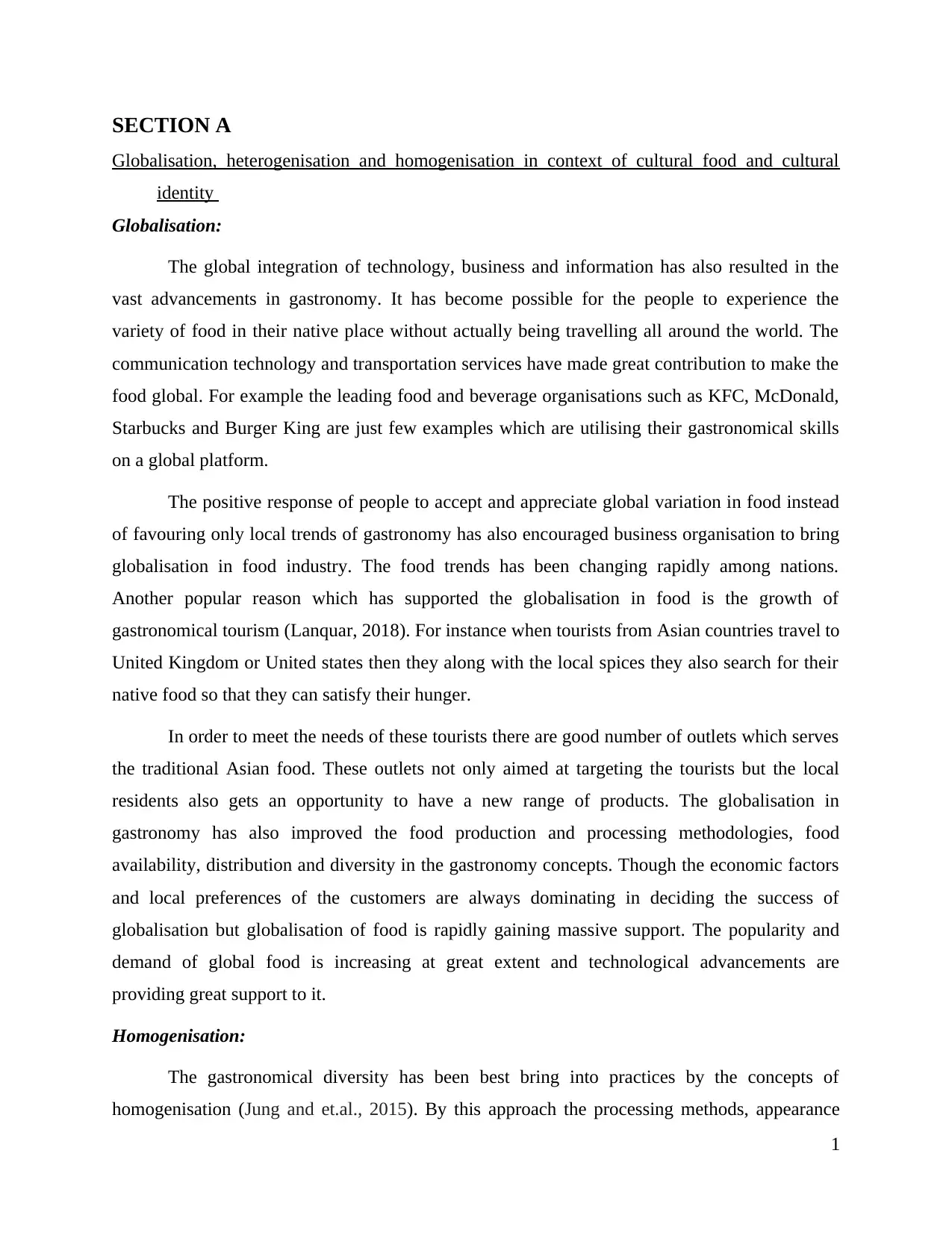
SECTION A
Globalisation, heterogenisation and homogenisation in context of cultural food and cultural
identity
Globalisation:
The global integration of technology, business and information has also resulted in the
vast advancements in gastronomy. It has become possible for the people to experience the
variety of food in their native place without actually being travelling all around the world. The
communication technology and transportation services have made great contribution to make the
food global. For example the leading food and beverage organisations such as KFC, McDonald,
Starbucks and Burger King are just few examples which are utilising their gastronomical skills
on a global platform.
The positive response of people to accept and appreciate global variation in food instead
of favouring only local trends of gastronomy has also encouraged business organisation to bring
globalisation in food industry. The food trends has been changing rapidly among nations.
Another popular reason which has supported the globalisation in food is the growth of
gastronomical tourism (Lanquar, 2018). For instance when tourists from Asian countries travel to
United Kingdom or United states then they along with the local spices they also search for their
native food so that they can satisfy their hunger.
In order to meet the needs of these tourists there are good number of outlets which serves
the traditional Asian food. These outlets not only aimed at targeting the tourists but the local
residents also gets an opportunity to have a new range of products. The globalisation in
gastronomy has also improved the food production and processing methodologies, food
availability, distribution and diversity in the gastronomy concepts. Though the economic factors
and local preferences of the customers are always dominating in deciding the success of
globalisation but globalisation of food is rapidly gaining massive support. The popularity and
demand of global food is increasing at great extent and technological advancements are
providing great support to it.
Homogenisation:
The gastronomical diversity has been best bring into practices by the concepts of
homogenisation (Jung and et.al., 2015). By this approach the processing methods, appearance
1
Globalisation, heterogenisation and homogenisation in context of cultural food and cultural
identity
Globalisation:
The global integration of technology, business and information has also resulted in the
vast advancements in gastronomy. It has become possible for the people to experience the
variety of food in their native place without actually being travelling all around the world. The
communication technology and transportation services have made great contribution to make the
food global. For example the leading food and beverage organisations such as KFC, McDonald,
Starbucks and Burger King are just few examples which are utilising their gastronomical skills
on a global platform.
The positive response of people to accept and appreciate global variation in food instead
of favouring only local trends of gastronomy has also encouraged business organisation to bring
globalisation in food industry. The food trends has been changing rapidly among nations.
Another popular reason which has supported the globalisation in food is the growth of
gastronomical tourism (Lanquar, 2018). For instance when tourists from Asian countries travel to
United Kingdom or United states then they along with the local spices they also search for their
native food so that they can satisfy their hunger.
In order to meet the needs of these tourists there are good number of outlets which serves
the traditional Asian food. These outlets not only aimed at targeting the tourists but the local
residents also gets an opportunity to have a new range of products. The globalisation in
gastronomy has also improved the food production and processing methodologies, food
availability, distribution and diversity in the gastronomy concepts. Though the economic factors
and local preferences of the customers are always dominating in deciding the success of
globalisation but globalisation of food is rapidly gaining massive support. The popularity and
demand of global food is increasing at great extent and technological advancements are
providing great support to it.
Homogenisation:
The gastronomical diversity has been best bring into practices by the concepts of
homogenisation (Jung and et.al., 2015). By this approach the processing methods, appearance
1
⊘ This is a preview!⊘
Do you want full access?
Subscribe today to unlock all pages.

Trusted by 1+ million students worldwide
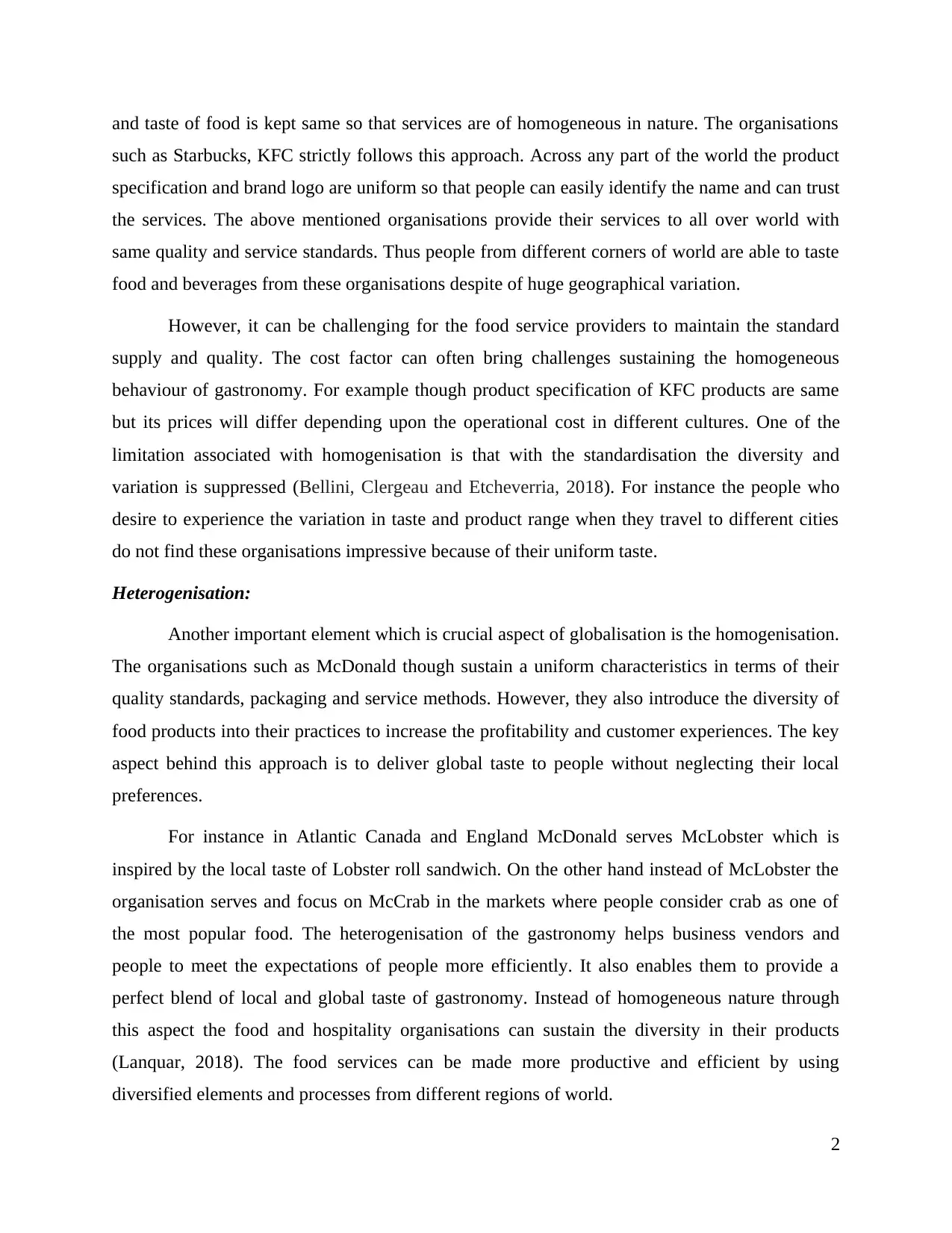
and taste of food is kept same so that services are of homogeneous in nature. The organisations
such as Starbucks, KFC strictly follows this approach. Across any part of the world the product
specification and brand logo are uniform so that people can easily identify the name and can trust
the services. The above mentioned organisations provide their services to all over world with
same quality and service standards. Thus people from different corners of world are able to taste
food and beverages from these organisations despite of huge geographical variation.
However, it can be challenging for the food service providers to maintain the standard
supply and quality. The cost factor can often bring challenges sustaining the homogeneous
behaviour of gastronomy. For example though product specification of KFC products are same
but its prices will differ depending upon the operational cost in different cultures. One of the
limitation associated with homogenisation is that with the standardisation the diversity and
variation is suppressed (Bellini, Clergeau and Etcheverria, 2018). For instance the people who
desire to experience the variation in taste and product range when they travel to different cities
do not find these organisations impressive because of their uniform taste.
Heterogenisation:
Another important element which is crucial aspect of globalisation is the homogenisation.
The organisations such as McDonald though sustain a uniform characteristics in terms of their
quality standards, packaging and service methods. However, they also introduce the diversity of
food products into their practices to increase the profitability and customer experiences. The key
aspect behind this approach is to deliver global taste to people without neglecting their local
preferences.
For instance in Atlantic Canada and England McDonald serves McLobster which is
inspired by the local taste of Lobster roll sandwich. On the other hand instead of McLobster the
organisation serves and focus on McCrab in the markets where people consider crab as one of
the most popular food. The heterogenisation of the gastronomy helps business vendors and
people to meet the expectations of people more efficiently. It also enables them to provide a
perfect blend of local and global taste of gastronomy. Instead of homogeneous nature through
this aspect the food and hospitality organisations can sustain the diversity in their products
(Lanquar, 2018). The food services can be made more productive and efficient by using
diversified elements and processes from different regions of world.
2
such as Starbucks, KFC strictly follows this approach. Across any part of the world the product
specification and brand logo are uniform so that people can easily identify the name and can trust
the services. The above mentioned organisations provide their services to all over world with
same quality and service standards. Thus people from different corners of world are able to taste
food and beverages from these organisations despite of huge geographical variation.
However, it can be challenging for the food service providers to maintain the standard
supply and quality. The cost factor can often bring challenges sustaining the homogeneous
behaviour of gastronomy. For example though product specification of KFC products are same
but its prices will differ depending upon the operational cost in different cultures. One of the
limitation associated with homogenisation is that with the standardisation the diversity and
variation is suppressed (Bellini, Clergeau and Etcheverria, 2018). For instance the people who
desire to experience the variation in taste and product range when they travel to different cities
do not find these organisations impressive because of their uniform taste.
Heterogenisation:
Another important element which is crucial aspect of globalisation is the homogenisation.
The organisations such as McDonald though sustain a uniform characteristics in terms of their
quality standards, packaging and service methods. However, they also introduce the diversity of
food products into their practices to increase the profitability and customer experiences. The key
aspect behind this approach is to deliver global taste to people without neglecting their local
preferences.
For instance in Atlantic Canada and England McDonald serves McLobster which is
inspired by the local taste of Lobster roll sandwich. On the other hand instead of McLobster the
organisation serves and focus on McCrab in the markets where people consider crab as one of
the most popular food. The heterogenisation of the gastronomy helps business vendors and
people to meet the expectations of people more efficiently. It also enables them to provide a
perfect blend of local and global taste of gastronomy. Instead of homogeneous nature through
this aspect the food and hospitality organisations can sustain the diversity in their products
(Lanquar, 2018). The food services can be made more productive and efficient by using
diversified elements and processes from different regions of world.
2
Paraphrase This Document
Need a fresh take? Get an instant paraphrase of this document with our AI Paraphraser
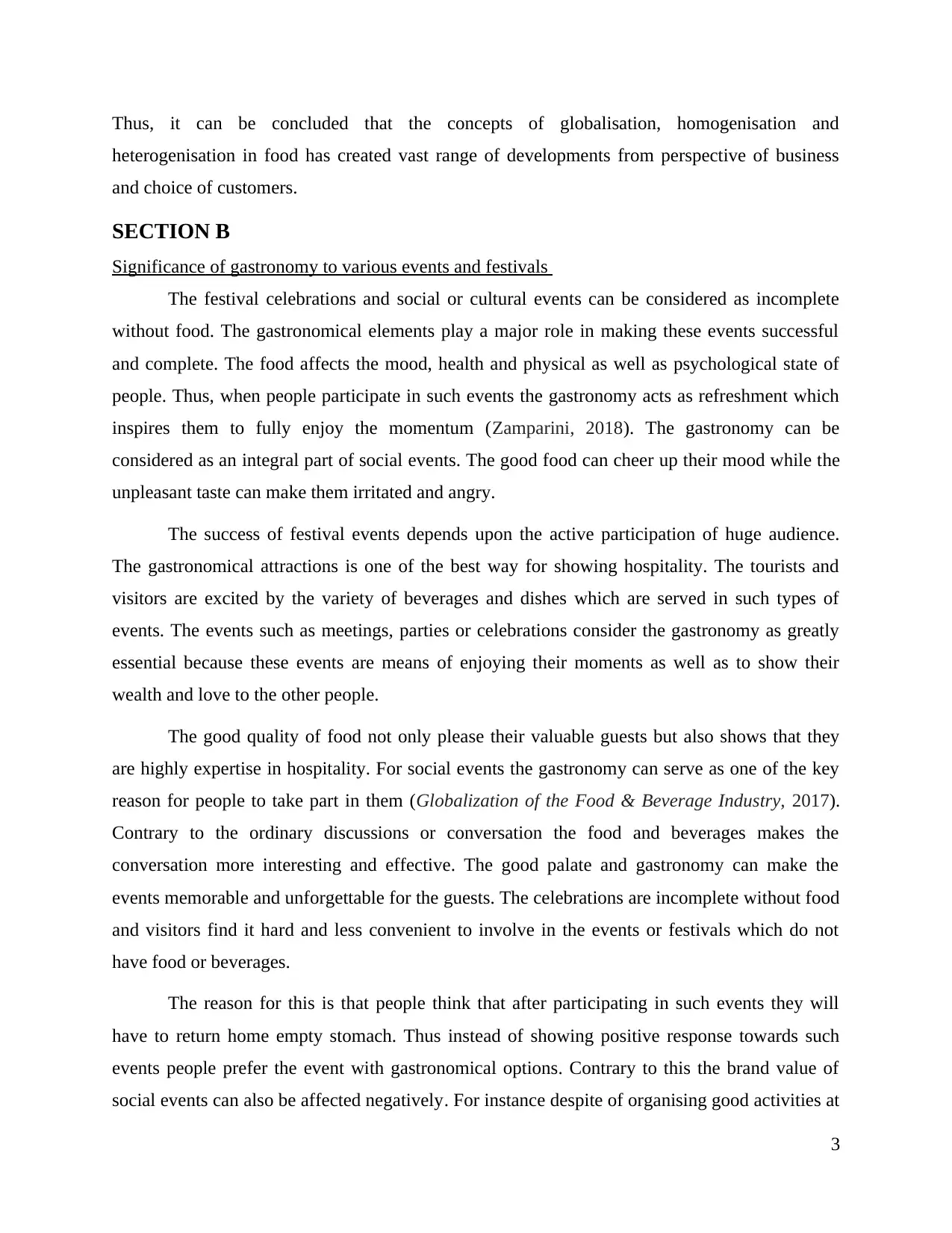
Thus, it can be concluded that the concepts of globalisation, homogenisation and
heterogenisation in food has created vast range of developments from perspective of business
and choice of customers.
SECTION B
Significance of gastronomy to various events and festivals
The festival celebrations and social or cultural events can be considered as incomplete
without food. The gastronomical elements play a major role in making these events successful
and complete. The food affects the mood, health and physical as well as psychological state of
people. Thus, when people participate in such events the gastronomy acts as refreshment which
inspires them to fully enjoy the momentum (Zamparini, 2018). The gastronomy can be
considered as an integral part of social events. The good food can cheer up their mood while the
unpleasant taste can make them irritated and angry.
The success of festival events depends upon the active participation of huge audience.
The gastronomical attractions is one of the best way for showing hospitality. The tourists and
visitors are excited by the variety of beverages and dishes which are served in such types of
events. The events such as meetings, parties or celebrations consider the gastronomy as greatly
essential because these events are means of enjoying their moments as well as to show their
wealth and love to the other people.
The good quality of food not only please their valuable guests but also shows that they
are highly expertise in hospitality. For social events the gastronomy can serve as one of the key
reason for people to take part in them (Globalization of the Food & Beverage Industry, 2017).
Contrary to the ordinary discussions or conversation the food and beverages makes the
conversation more interesting and effective. The good palate and gastronomy can make the
events memorable and unforgettable for the guests. The celebrations are incomplete without food
and visitors find it hard and less convenient to involve in the events or festivals which do not
have food or beverages.
The reason for this is that people think that after participating in such events they will
have to return home empty stomach. Thus instead of showing positive response towards such
events people prefer the event with gastronomical options. Contrary to this the brand value of
social events can also be affected negatively. For instance despite of organising good activities at
3
heterogenisation in food has created vast range of developments from perspective of business
and choice of customers.
SECTION B
Significance of gastronomy to various events and festivals
The festival celebrations and social or cultural events can be considered as incomplete
without food. The gastronomical elements play a major role in making these events successful
and complete. The food affects the mood, health and physical as well as psychological state of
people. Thus, when people participate in such events the gastronomy acts as refreshment which
inspires them to fully enjoy the momentum (Zamparini, 2018). The gastronomy can be
considered as an integral part of social events. The good food can cheer up their mood while the
unpleasant taste can make them irritated and angry.
The success of festival events depends upon the active participation of huge audience.
The gastronomical attractions is one of the best way for showing hospitality. The tourists and
visitors are excited by the variety of beverages and dishes which are served in such types of
events. The events such as meetings, parties or celebrations consider the gastronomy as greatly
essential because these events are means of enjoying their moments as well as to show their
wealth and love to the other people.
The good quality of food not only please their valuable guests but also shows that they
are highly expertise in hospitality. For social events the gastronomy can serve as one of the key
reason for people to take part in them (Globalization of the Food & Beverage Industry, 2017).
Contrary to the ordinary discussions or conversation the food and beverages makes the
conversation more interesting and effective. The good palate and gastronomy can make the
events memorable and unforgettable for the guests. The celebrations are incomplete without food
and visitors find it hard and less convenient to involve in the events or festivals which do not
have food or beverages.
The reason for this is that people think that after participating in such events they will
have to return home empty stomach. Thus instead of showing positive response towards such
events people prefer the event with gastronomical options. Contrary to this the brand value of
social events can also be affected negatively. For instance despite of organising good activities at
3
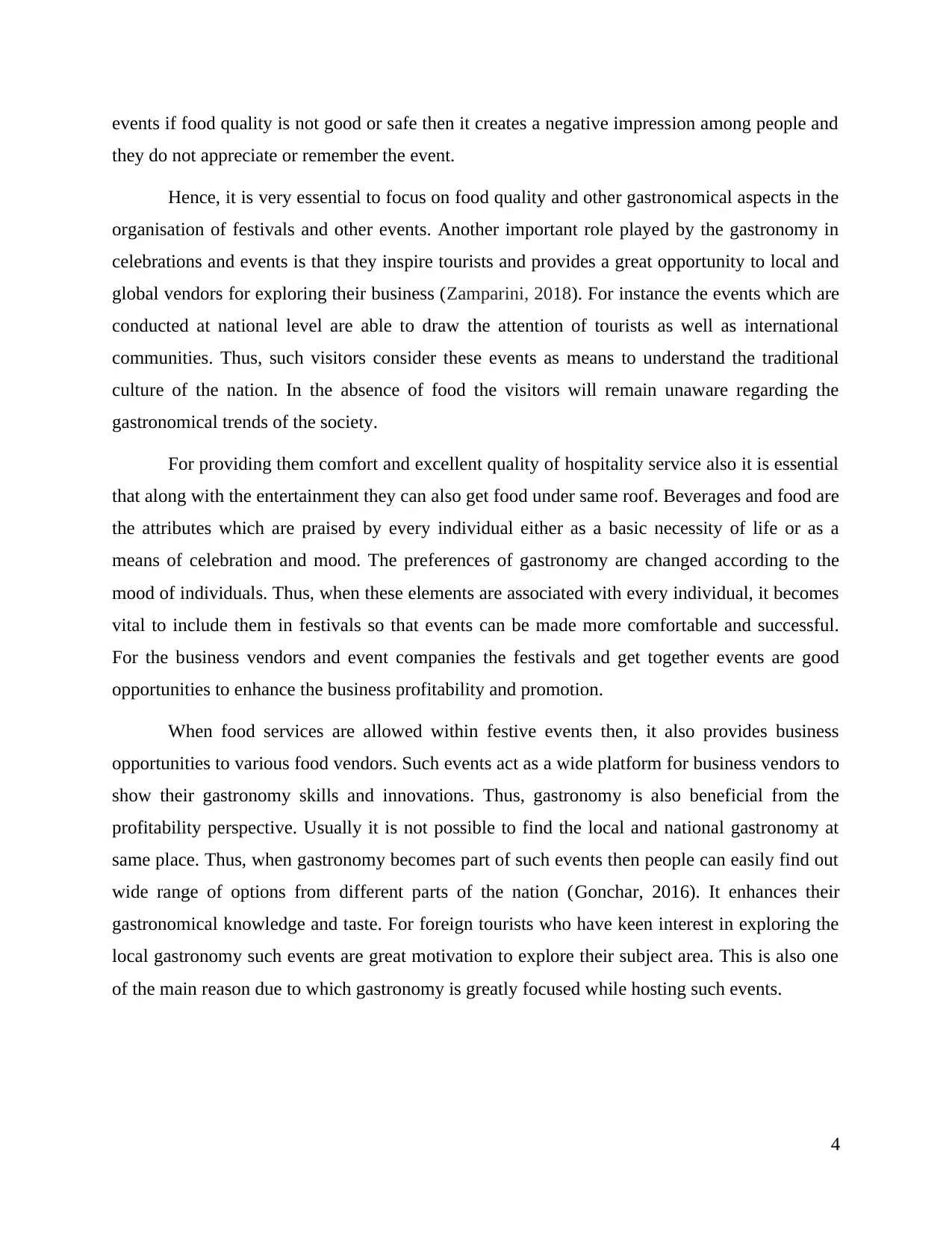
events if food quality is not good or safe then it creates a negative impression among people and
they do not appreciate or remember the event.
Hence, it is very essential to focus on food quality and other gastronomical aspects in the
organisation of festivals and other events. Another important role played by the gastronomy in
celebrations and events is that they inspire tourists and provides a great opportunity to local and
global vendors for exploring their business (Zamparini, 2018). For instance the events which are
conducted at national level are able to draw the attention of tourists as well as international
communities. Thus, such visitors consider these events as means to understand the traditional
culture of the nation. In the absence of food the visitors will remain unaware regarding the
gastronomical trends of the society.
For providing them comfort and excellent quality of hospitality service also it is essential
that along with the entertainment they can also get food under same roof. Beverages and food are
the attributes which are praised by every individual either as a basic necessity of life or as a
means of celebration and mood. The preferences of gastronomy are changed according to the
mood of individuals. Thus, when these elements are associated with every individual, it becomes
vital to include them in festivals so that events can be made more comfortable and successful.
For the business vendors and event companies the festivals and get together events are good
opportunities to enhance the business profitability and promotion.
When food services are allowed within festive events then, it also provides business
opportunities to various food vendors. Such events act as a wide platform for business vendors to
show their gastronomy skills and innovations. Thus, gastronomy is also beneficial from the
profitability perspective. Usually it is not possible to find the local and national gastronomy at
same place. Thus, when gastronomy becomes part of such events then people can easily find out
wide range of options from different parts of the nation (Gonchar, 2016). It enhances their
gastronomical knowledge and taste. For foreign tourists who have keen interest in exploring the
local gastronomy such events are great motivation to explore their subject area. This is also one
of the main reason due to which gastronomy is greatly focused while hosting such events.
4
they do not appreciate or remember the event.
Hence, it is very essential to focus on food quality and other gastronomical aspects in the
organisation of festivals and other events. Another important role played by the gastronomy in
celebrations and events is that they inspire tourists and provides a great opportunity to local and
global vendors for exploring their business (Zamparini, 2018). For instance the events which are
conducted at national level are able to draw the attention of tourists as well as international
communities. Thus, such visitors consider these events as means to understand the traditional
culture of the nation. In the absence of food the visitors will remain unaware regarding the
gastronomical trends of the society.
For providing them comfort and excellent quality of hospitality service also it is essential
that along with the entertainment they can also get food under same roof. Beverages and food are
the attributes which are praised by every individual either as a basic necessity of life or as a
means of celebration and mood. The preferences of gastronomy are changed according to the
mood of individuals. Thus, when these elements are associated with every individual, it becomes
vital to include them in festivals so that events can be made more comfortable and successful.
For the business vendors and event companies the festivals and get together events are good
opportunities to enhance the business profitability and promotion.
When food services are allowed within festive events then, it also provides business
opportunities to various food vendors. Such events act as a wide platform for business vendors to
show their gastronomy skills and innovations. Thus, gastronomy is also beneficial from the
profitability perspective. Usually it is not possible to find the local and national gastronomy at
same place. Thus, when gastronomy becomes part of such events then people can easily find out
wide range of options from different parts of the nation (Gonchar, 2016). It enhances their
gastronomical knowledge and taste. For foreign tourists who have keen interest in exploring the
local gastronomy such events are great motivation to explore their subject area. This is also one
of the main reason due to which gastronomy is greatly focused while hosting such events.
4
⊘ This is a preview!⊘
Do you want full access?
Subscribe today to unlock all pages.

Trusted by 1+ million students worldwide
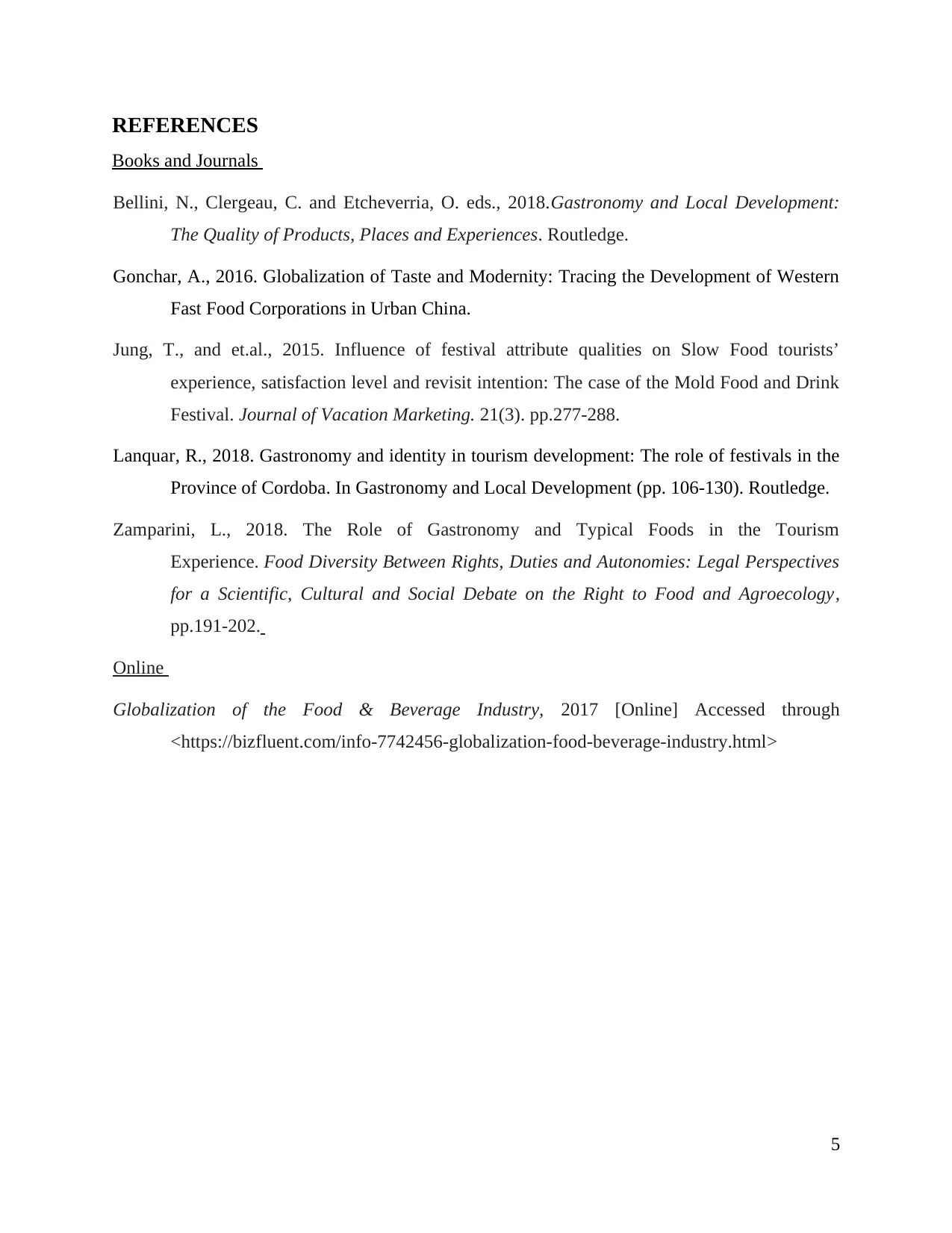
REFERENCES
Books and Journals
Bellini, N., Clergeau, C. and Etcheverria, O. eds., 2018.Gastronomy and Local Development:
The Quality of Products, Places and Experiences. Routledge.
Gonchar, A., 2016. Globalization of Taste and Modernity: Tracing the Development of Western
Fast Food Corporations in Urban China.
Jung, T., and et.al., 2015. Influence of festival attribute qualities on Slow Food tourists’
experience, satisfaction level and revisit intention: The case of the Mold Food and Drink
Festival. Journal of Vacation Marketing. 21(3). pp.277-288.
Lanquar, R., 2018. Gastronomy and identity in tourism development: The role of festivals in the
Province of Cordoba. In Gastronomy and Local Development (pp. 106-130). Routledge.
Zamparini, L., 2018. The Role of Gastronomy and Typical Foods in the Tourism
Experience. Food Diversity Between Rights, Duties and Autonomies: Legal Perspectives
for a Scientific, Cultural and Social Debate on the Right to Food and Agroecology,
pp.191-202.
Online
Globalization of the Food & Beverage Industry, 2017 [Online] Accessed through
<https://bizfluent.com/info-7742456-globalization-food-beverage-industry.html>
5
Books and Journals
Bellini, N., Clergeau, C. and Etcheverria, O. eds., 2018.Gastronomy and Local Development:
The Quality of Products, Places and Experiences. Routledge.
Gonchar, A., 2016. Globalization of Taste and Modernity: Tracing the Development of Western
Fast Food Corporations in Urban China.
Jung, T., and et.al., 2015. Influence of festival attribute qualities on Slow Food tourists’
experience, satisfaction level and revisit intention: The case of the Mold Food and Drink
Festival. Journal of Vacation Marketing. 21(3). pp.277-288.
Lanquar, R., 2018. Gastronomy and identity in tourism development: The role of festivals in the
Province of Cordoba. In Gastronomy and Local Development (pp. 106-130). Routledge.
Zamparini, L., 2018. The Role of Gastronomy and Typical Foods in the Tourism
Experience. Food Diversity Between Rights, Duties and Autonomies: Legal Perspectives
for a Scientific, Cultural and Social Debate on the Right to Food and Agroecology,
pp.191-202.
Online
Globalization of the Food & Beverage Industry, 2017 [Online] Accessed through
<https://bizfluent.com/info-7742456-globalization-food-beverage-industry.html>
5
Paraphrase This Document
Need a fresh take? Get an instant paraphrase of this document with our AI Paraphraser

6
1 out of 8
Related Documents
Your All-in-One AI-Powered Toolkit for Academic Success.
+13062052269
info@desklib.com
Available 24*7 on WhatsApp / Email
![[object Object]](/_next/static/media/star-bottom.7253800d.svg)
Unlock your academic potential
Copyright © 2020–2026 A2Z Services. All Rights Reserved. Developed and managed by ZUCOL.





